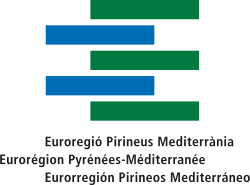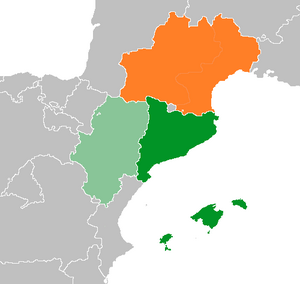Pyrenees–Mediterranean Euroregion
Topic: Place
 From HandWiki - Reading time: 2 min
From HandWiki - Reading time: 2 min
  Map | |
| Agency overview | |
|---|---|
| Formed | 2004 |
| Jurisdiction | Northwestern Mediterranean |
| Headquarters |
|
| Website | Pyrenees–Mediterranean Euroregion |
The Pyrenees–Mediterranean Euroregion (Euroregió Pirineus Mediterrània; Eurorégion Pyrénées–Méditerannée; Eurorregión Pirineos Mediterráneo; Euroregion Pirenèus-Mediterranèa; EPM; also known as the Pyrenees Mediterranean European Grouping for Territorial Cooperation (EGTC)[1]) is a Euroregion founded on the 29 October 2004.[2][3] It is a political cooperation project between Catalonia, the Balearic Islands, and Occitanie.[4] The Autonomous Community of Aragon suspended participation in 2006 due to an ongoing conflict with Catalonia about some religious art.[5]
Aim
The aim of the Pyrenees–Mediterranean Euroregion is to create sustainable development within the northwest Mediterranean, to further innovation within these areas, and to contribute to a "socially conscious" Europe, focusing on implementing these factors through innovation, technology and other sources via the European Union's Cohesion Policy.[6]
EPM also focuses on fostering cooperation between cultural and economic networks within the northwest Mediterranean region.
Projects
Projects of the EPM include the allocation of centres of higher education and initiatives for a "Eurocampus" and business creation.
Structure
Since August 2009, The EPM established a legal entity consisting of a rotating presidency,[7] similar in details to the president of the Euroregion, a general assembly and a technical team.
Offices
The EPM hosts three offices in Europe including Toulouse, France (Directorate), Barcelona, Spain (General Secretariat) and Brussels, Belgium (Representation to the European Union).
References
- ↑ The full name in English is made explicit in this news item on the European Union Committee of Regions (EGTC) website, at "The Pyrenees Mediterranean Euroregion launches CreaMed, a European project that aims to support new entrepreneurs" , 8 December 2010.
- ↑ "Què és la Euroregió" ("What is this Euroregion?") , on the Pyrenees–Mediterranean Euroregion's official website, in Catalan, French and Spanish.
- ↑ "How Did the Pyrenees-Mediterranean Euroregion Come About?", European Report, 4 October 2010, via "Goliath: Business Knowledge on Demand".
- ↑ (Convention 2008)
- ↑ Aragón Radio (23 March 2006). "Aragón no rompe sus relaciones con Cataluña pero suspende su participación en la Eurorregión" (in Spanish). Aragón TV. Archived from the original on 29 June 2012. https://archive.is/20120629091707/http://www.aragontelevision.es/index.php/mod.noticias/mem.detalle/idnoticia.4510/relcategoria.1031/idmenu.33/chk.365713ff304ced78c09c14082b800fca.html. Retrieved 2011-12-20.
- ↑ (Statuts 2009)
- ↑ (Statuts 2009)
Sources
- Some material from this article is taken from the French Wikipedia article GECT Pyrénées-Mediterranée.
External links
- REGULATION (EC) No 1082/2006 OF THE EUROPEAN PARLIAMENT AND OF THE COUNCIL of 5 July 2006 on a European grouping of territorial cooperation (EGTC)
- SCADPlus: European Grouping of Territorial Cooperation (EGTC)
- Euroregion website
- Portal Cultura
- UE Committee of Regions Committee of Regions website
 KSF
KSF